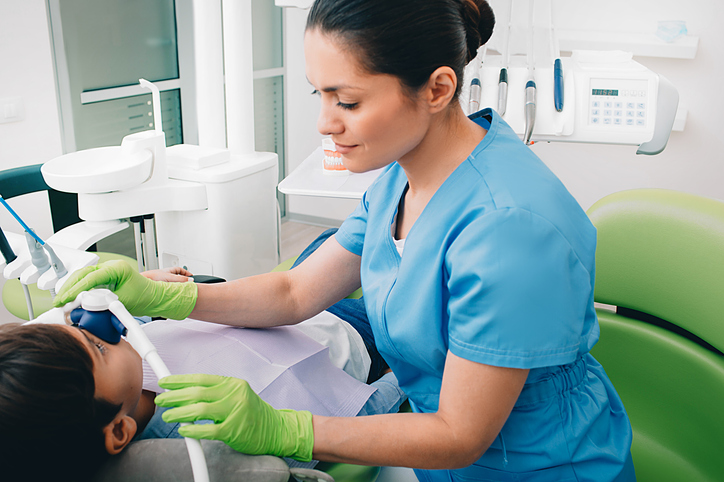
Are you worried that your dental procedure will be painful? Fortunately, dental anesthesia helps take away all of the discomfort!
Let’s be honest, dental work can hurt! And if you’re nervous about the prospect of a painful experience, you’re not alone. One study estimates between 10 percent and 30 percent of people feel anxious about going to the dentist.
The truth is that there’s really nothing to be worried about. Dental anesthesia has been used for decades to make patients feel comfortable in the dentist’s chair. Dental offices have three types of anesthesia available, which we will explain in detail below.
Three types of dental anesthesia and what to expect from each
Anesthesia prevents you from feeling any pain during surgery. Depending upon the length of the procedure and your health status, your dentist may offer one of three anesthetics:
Local. Local anesthesia numbs a localized area and works by blocking the nerves in the tissues from sending pain signals. Local anesthesia is applied topically or via injection. It’s often used for less complicated procedures, such as filing a cavity. While local anesthesia doesn’t usually cause side effects, you may experience some facial numbness until the anesthesia wears off.
Sedation. There are three types of sedation: mild, moderate, or deep. Depending on the level of sedation, you will either be awake, semiconscious, or unconscious. Sedation is recommended for wisdom tooth extractions or patients extremely anxious about the procedure. Afterward, you may feel drowsy and nauseous for a short time. Some patients have also reported headaches.
General. General anesthesia given through a face mask or IV will put you completely to sleep. It will help you through more complex oral surgeries, such as an impacted wisdom tooth removal or dental implant placement. Side effects may include nausea, headaches, confusion, and chills. A sore throat, dry mouth, and slurred speech may also occur.
Preparing for your dental appointment
Side effects from dental anesthesia are exceedingly rare. Patients typically completely recover within hours of the procedure. But if you know you’re scheduled for an appointment during which your dentist will use anesthesia, you can ask these questions to prepare yourself.
What should I expect during and after the procedure? Your dentist will go over the type of anesthesia and the degree of pain (if any) you may feel. They will tell you the possible side effects and how long they usually last. If you notice the side effects continuing longer than usual, or if you experience other symptoms, talk to your dentist immediately.
Can I take my medications? Tell your dentist about any and all medications you take for chronic health conditions, including over-the-counter medications, prescription drugs, and supplements. Since dental work may make you bleed, alert your doctor if you take blood thinners. Also, inform your dentist if you have had a bad reaction to anesthesia. You can still undergo anesthesia, but your dentist may have to adjust the dosage or advise you to stop taking the medications before the procedure. And always tell your dentist if you are pregnant or planning on becoming pregnant.
What should I do after I leave the office? Your dentist will provide detailed instructions about what you can do after the procedure is over. You may have to eat soft foods for a while or be careful about brushing your teeth until you fully heal. If sedation or general anesthesia is used, ask your dentist whether you need someone to drive you home.
Painful dental procedures are a thing of the past. With anesthesia, you won’t feel anything, and your teeth will be healthier for it.
Get ready for your dental appointment at Espire Dental
Schedule an appointment at Espire’s Oklahoma City, OK, location today! Our highly trained dentists will ensure your appointment is as pain-free as possible. We’ll answer all your questions about the anesthesia we use to ease your mind. Don’t live near our Oklahoma City office? Find one of our other locations near you.
Oklahoma City, OK
12448 St Andrews Drive
Oklahoma City, OK 73120
